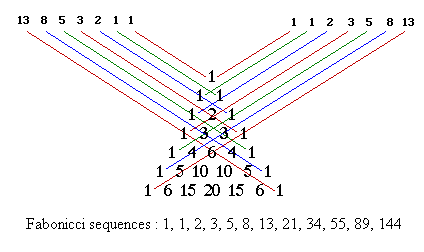-
Q01 |
- Diagram : Chebyshev's polynomials in Pascal triangle
- Q02 | - Chebyshev's polynomials in quadratical polynomial
- Q03 | - Chebyshev's polynomials in 3rd degrees polynomial
- Q04 | - Chebyshev's polynomials in 4th degrees polynomial
- Q05 | -
- Q02 | - Chebyshev's polynomials in quadratical polynomial
Q01. Diagram : Fibonacci sequences in Pascal triangle

|
Go to Begin
Q02. Chebyshev's polynomials in 2nd degrees polynomial
+1
+1 1
+1 2 1*
+1 3* 3 1
+1* 4 6 6 1
1 5 10 10 5 1
1. Definition
a. The 2nd degree Chebyshev's poynomial is x^2 + 3*x + 1
b. The coefficients are 1*, 3*, 1* in Pascal triangle
2. Chebyshev's equation
a. Equation is x^2 + 3*x + 1 = 0
b. Solution is x = -4*cos(k*pi/5)^2 and k = 1, 2
c. Use calculator, we have
k = 1 and x = -4*cos(1*pi/5)^2 = -2.6180
k = 2 and x = -4*cos(2*pi/5)^2 = -0.3820
d. Verify using quadratic formula
x = (-3 + Sqr(3^2 - 4*1*1))/4 = -0.3820
x = (-3 - Sqr(3^2 - 4*1*1))/4 = -2.6180
3. Question : What is the number 5 in x = -4*cos(k*pi/5)^2 ?
Answer : Thery are the 1's with +1 in Pascal triangle
Go to Begin
Q03. Chebyshev's polynomials in 3rd degrees polynomial
+1
+1 1
+1 2 1
+1 3 3 1*
+1 4 6* 6 1
+1 5*10 10 5 1
+1* 6 15 20 15 6 1
1 7 21 35 35 21 7 1
1. Definition of 3nd degree Chebyshev's poynomial
a. The polynomial is x^3 + 5*x^2 +6*x + 1
b. The coefficients are 1*, 5* 6*, 1* in Pascal triangle
2. Chebyshev's equation
a. Equation is x^3 + 5*x^2 + 6*x + 1 = 0
b. Solution is x = -4*cos(k*pi/7)^2 and k = 1, 2, 3
c. Use calculator, we have
k = 1 and x = -4*cos(1*pi/7)^2 = -3.2470
k = 2 and x = -4*cos(2*pi/7)^2 =
K = 3 and x = -4*cos(3*pi/7)^2 =
d. Verify by substituting roots into polynomial
(-3.2470)^3 + 5*(-3.2470)^2 + 6*(-3.2470) + 1
= -34.2332 + 52.7150 - 19.4820 + 1
= -0.0001
3. Question : What is the number 7 in x = -4*cos(k*pi/7)^2 ?
Answer : Thery are the 1's with +1 in Pascal triangle
Go to Begin
Q04. Chebyshev's polynomials in 4th degrees polynomial
+1
+1 1
+1 2 1
+1 3 3 1
+1 4 6 6 1*
+1 5 10 10* 5 1
+1 6 15* 20 15 6 1
+1 7* 21 35 35 21 7 1
+1* 8 28 56 70 56 28 8 1
1 9 36 84 126 126 84 36 9 1
1. Definition of 3nd degree Chebyshev's poynomial
a. The polynomial is xx^4 + 7*x^3 + 15*x^2 + 10*x + 1
b. The coefficients are 1*, 7* 15*, 10*, 1* in Pascal triangle
2. Chebyshev's equation
a. Equation is x^4 + 7*x^3 + 15*x^2 + 10*x + 1 = 0
b. Solution is x = -4*cos(k*pi/9)^2 and k = 1, 2, 3, 4
c. Use calculator, we have
k = 1 and x = -4*cos(1*pi/9)^2 = -3.5321
k = 2 and x = -4*cos(2*pi/9)^2 =
K = 3 and x = -4*cos(3*pi/9)^2 =
k = 4 and x = -4*cos(4*pi/9)^2 =
d. Verify by substituting roots into polynomial
(-3.5321)^4+7*(-3.5321)^3+15*(-3.5321)^2+10*(-3.5321)+1
= 155.6439 -308.4587 + 187.1360 - 35.3210 + 1
= 0.0002
3. Question : What is the number 9 in x = -4*cos(k*pi/9)^2 ?
Answer : Thery are the 1's with +1 in Pascal triangle
4. General solution for nth degree polynomial
2nd degrees 5
3rd degrees 7
4th degrees 9
5th degrees 11
nth degrees 2*n + 1
x = -4*cos(k*pi/(2*n+1))^2 and k = 1,2,3,4,....n
Go to Begin
Q05. Chebyshev's polynomials in 4th degrees polynomial
Exercises
1. Write down the 5th degree polynomial 2. Write down the solutions 3. Find solution for k = 1 4. Substitute x value into polynomial to verify
Go to Begin
